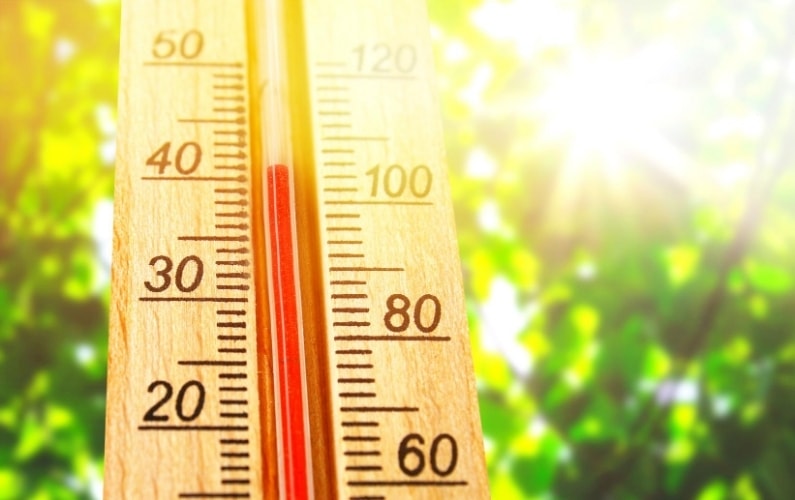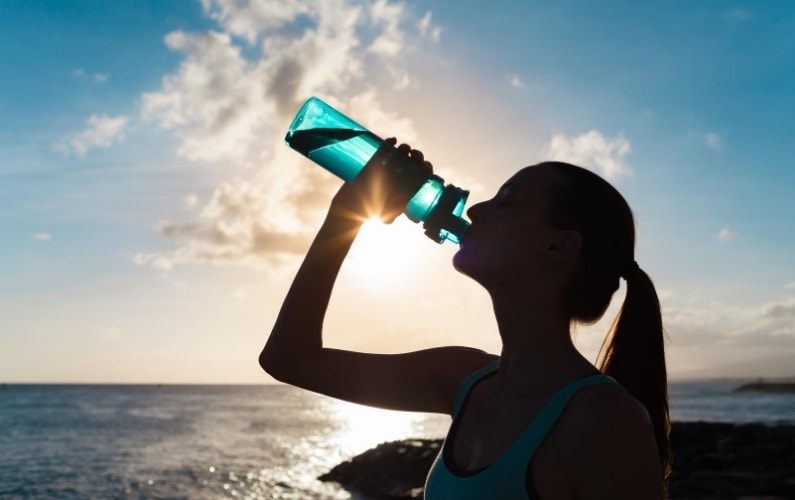How to Stay Cool During a Heat Wave

Learn how you can beat the heat this summer and stay cool during a heat wave!
It’s hard to imagine heat waves occur in a place like Canada, a country dubbed as ‘the winter capital of the world’. However, due to global warming, extreme heat events are becoming a common occurrence.
Heat waves don’t just come with uncomfortable temperatures—they also bring increased risk factors for health problems like heat illnesses. Even when you’re not outdoors, it’s important to take precautions to keep yourself safe and hydrated.
In this article we’ll discuss some tips on how to stay cool during a heat wave along with expert-approved safety tips for the hot summer season.
Let’s get started!
What is a Heat Wave?
A heat wave is a period of high temperatures, often accompanied by high humidity. While the temperature extremes vary across regions, it is clear that extended periods of high heat can have a detrimental impact on people’s health.
According to The Weather Network, the British Columbia heat waves in the summer of 2021 contributed to the deaths of almost 600 people. These unprecedented temperature records were caused by wildfires, a heat dome, and global warming.
B.C. Heat Waves in 2022
This summer, British Columbia is expected to face another extreme heat wave. The province will likely face temperatures above 30 degrees celsius between now and August. This will make outdoor activities more dangerous, especially for those who are not used to the heat or have health conditions that make them more susceptible to dehydration and heatstroke.
If you plan on spending time outside this summer, make sure you’re prepared by following the tips in this post.
Health Risks of Heat Waves
Prolonged exposure to high temperatures may cause heat-related emergencies such as heat exhaustion, dehydration, heat stroke, and heat cramps. How? The human body generates heat, even more so during physical activity. Hot surfaces, sun rays, and hot air will also increase your body temperature. Your body cools down when it sweats or comes into contact with cooled air. This contact between hot and cold, makes sweat evaporate.
Likewise, the weather plays a significant role in how your body controls its temperature. For instance, on a windy day, your sweat evaporates quickly, helping you cool down. During days with high humidity, this process slows down, contributing to elevated body temperature.
Heat-related illnesses have an enduring impact on your health and may also cause long-term issues. This occurs if you’re over-exposed to very hot temperatures and if your activities are extreme for your age and physical health.
Examples of heat illnesses are:
- Heat exhaustion
- Heat fainting
- Muscle cramps
- Swelling of the hands, ankles, and feet
- Heat rash
- Heat stroke
Heat illnesses are a serious concern and can be life-threatening. It’s important to know the signs and symptoms so you can take the necessary precautions to prevent heat illness.
Common Heat Illness Symptoms
There are a few common symptoms of heat illness.
Mild heat illness: You might feel weak and lightheaded, you may get nauseous or dizzy, and you may have a headache or muscle cramps. This can last for several hours.
Moderate heat illness: You might experience any of the symptoms of mild heat illness, along with nausea or vomiting, weakness or dizziness that doesn’t go away when you rest, confusion, and rapid breathing (hyperventilation). This can last for several hours or longer.
Severe heat illness: You might also experience any of the symptoms of moderate heat illness along with fainting, seizures, increased heart rate, and unconsciousness. If left untreated it can lead to death.
If you experience any of these symptoms, get out of the heat immediately if you can, rest in a cool location, and drink plenty of water. If the symptoms are severe or don’t go away on their own, seek medical attention.
Who’s at Risk?
Everyone is at risk for heat illnesses, but the dangers are most significant for the following individuals:
- Homeless people
- Older adults
- People with chronic conditions like mental health, heart problems, etc.
- Low-income earners
- Infants and young kids
- People who work outside
- People who exercise outside
If you have a health condition, are currently taking medications, ask your pharmacist or doctor if it will increase your risk of developing heat illnesses.
How to Beat the Heat and Stay Cool During a Heat Wave
During extremely hot conditions, it’s essential to stay hydrated and cool. Here are five tips to protect yourself and your loved ones during a heat wave:
1. Early Preparations
- Keep up to date with the local weather forecast. This indicates when extra care is necessary.
- People who are part of the ‘high risk’ group mentioned above should request friends, family members, and neighbours to visit them regularly. Visitors will be able to identify symptoms of heat illness that might be missed on the phone.
- Look for ways to stay cool before the heat wave begins. Ensure the air conditioning system is working correctly by having it serviced BEFORE summer starts. Ceiling fans and table fans are excellent for circulating cool air, provided the humidity isn’t too high.
- Stock up on cool drinks. Keep a reusable water bottle handy so that it can be easily carried when you head outside.
- Keep the gas tank filled up.
- Pack a grab-and-go evacuation bag that includes all important personal items and medications in the case there is an emergency.
2. Pay attention to your health – and those around you!
Contact your local emergency number or dial 911 if the person you’re caring for is unconscious, has a high temperature, has stopped sweating, or is confused. Additionally, you should be on the lookout for the following symptoms of heat illness:
- Headache
- Vomiting or nausea
- Fainting or dizziness
- Decrease urine output with dark yellow urine
- Extreme thirst, sticky saliva, or dry mouth
- Rapid heartbeat or breathing
- Behaviour changes in children, i.e. temper tantrums, sleepiness.
If you are experiencing these symptoms during a heat wave, sit in a cool place and immediately drink water or liquids. While waiting for emergency help to arrive, cool down the person by:
- Shifting them to a cool location, if possible
- Fan the person as much as you can
- Apply cold water to large parts of their skin
3. Stay Hydrated
Drink lots of water and cool liquids BEFORE you feel thirsty. This decreases the risk of developing dehydration. Here are a few additional tips that can help:
- Set up a reminder on your cell phone to drink water at regular intervals.
- Drink water before, during, and after any physical activity.
- Drink natural fruit and vegetable juices.
- Eat more fruits and vegetables with high water content like watermelon, oranges, cucumbers, celery, and iceberg lettuce.

4. Stay Cool
The human body is not adapted to extremely hot temperatures. To keep your body temperature regulated, you might want to:
- Wear light-coloured, loose-fitting clothing.
- Wear sunglasses with both UVB and UVA protection.
- Take lots of breaks if you are physically active outside.
- Prepare meals that don’t require an oven.
- Block out the sun during the day time by closing the blinds, curtains, and awnings.
- Open your windows at night, to let in fresh and cool air.
- Set your air conditioner thermostat at 22ºC/72ºF to 26ºC/79ºF. This reduces energy costs and gives relief from the heat.
- If you don’t have an air conditioner or your home is very hot, take frequent cool showers.
- Use a table or ceiling fan to circulate air flow.
- Visit a place near your home with air-conditioning such as a mall, the public library, or grocery store.
5. Avoid direct exposure to the heat
If you have to go outside during a heat wave, ensure you protect your skin with an SPF 30 (or more) sunscreen. Without sunblock/sunscreen, you may get sunburned skin. Also, pay attention to the following:
- Avoid leaving your car in direct sunlight. Never leave a pet, child, or person inside a parked vehicle as this can be life-threatening.
- Before going out, check your city’s Air Quality Health Index. Air pollution can be higher during heat waves.
- Wear clothing made from a breathable fabric like cotton.
- Wear a wide-brimmed hat or use an umbrella.
- Wear sunglasses with UVA and UVB protection.
- Reschedule outdoor activities if possible.
Final Thoughts
We hope you’ve enjoyed this guide and found it helpful! We know that heat waves in British Columbia are an inevitable part of summer, but we also know that they don’t have to be a reason for despair. With these tips, you can make the best of every hot day and even enjoy yourself in the process.
For more information on how to beat a heat wave, additional cooling tips, or information about your medication, please contact one of our pharmacists today!
References:
https://www.canada.ca/en/health-canada/services/sun-safety/extreme-heat-heat-waves.html


